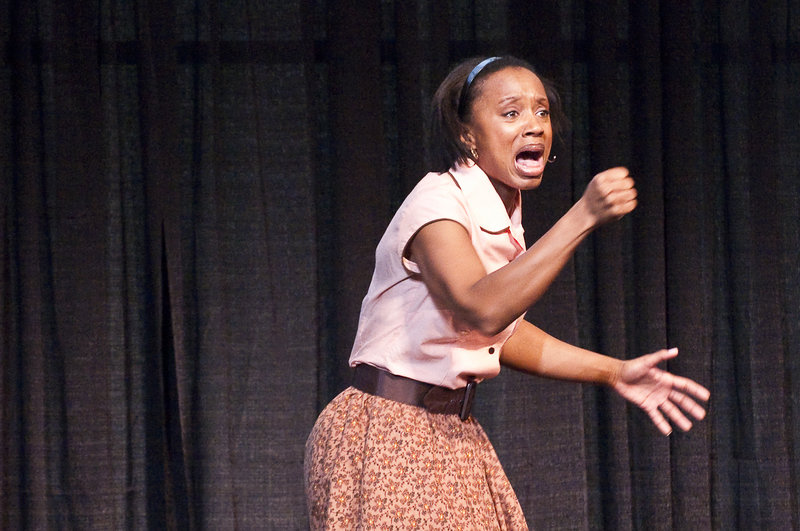In 1957, 15-year-old Melba Pattillo Beals crossed the racial barrier and became one of the first African-American students to enroll at Central High School in Little Rock, Ark.
She was part of a group of black students known as the Little Rock Nine, who faced mobs and overcame daily hostility as they integrated what had been an all-white school.
That same year, Julia Adams of Greensboro, N.C. — now a Portland resident — watched in disbelief when a sole African-American girl named Josephine Boyd demonstrated similar courage — and faced similar threats — when she became the first black student to enroll at Greensboro Senior High School.
The harassment was bad all the time, but was worst during lunch in the cafeteria. Boyd, who sat alone, sometimes retreated to the library so she could avoid the heckling.
Adams, who is white, felt badly for her classmate. Along with another friend, she offered to sit with Boyd for protection during lunch.
“We were a buffer for her that whole year,” Adams recalled. “It was a simple and natural thing to do. It meant a lot to her, and it meant a lot to us.”
Those stories are part of this week’s Martin Luther King Jr. celebration in Portland. Beals’ story is recounted in the play “Warriors Don’t Cry,” presented at 7:30 p.m. Wednesday at Hannaford Hall at the University of Southern Maine. Adams will tell her story as part of a pre-performance lecture.
Both events are presented by Portland Ovations.
“Warriors Don’t Cry” is a one-woman play adapted from Beals’ memoir. The performance by actress Almeria Campbell will chronicle the violent year in which black students risked their lives for equality in education. In the show, Campbell portrays 21 characters. Audiences should be aware that the show uses strong and historically accurate language, including racial slurs and derogatory terms.
Scott Galbraith, the play’s executive producer, helped adapt Beals’ book for the stage. He and a colleague from The Bushnell performing arts organization in Hartford, Conn., developed the piece to help Hartford explore issues surrounding equal access to education.
Galbraith appreciated the power of Beals’ memoir. “I could not put it down. It was a gripping and compelling story, and it had an intimate sense of drama to it,” he said.
“Warriors Don’t Cry” has proven to be both effective and popular. Campbell is traveling across New England performing the show. It resonates with current students, many of whom were unaware that schools once were segregated, as well as adults, some of whom have forgotten.
By illuminating a dark period in America’s recent past, the show helps audiences explore themes of bullying, hate speech and other issues of contemporary relevance, Galbraith said.
“It’s a very austere production,” he said. “We use minimal furniture and very little lighting support. Everything that happens exists in Melba’s memory. She is appealing directly to the audience, and it’s a very powerful message.”
Adams was interested in the play even before Portland Ovations invited her to participate in a pre-show discussion about hate speech and bullying. Beals’ memoir mirrored Boyd’s experience in North Carolina, she said.
Adams has been talking with students at King Middle School in Portland about the civil rights movement. The students developed a project, “Small Acts of Courage: Memories of the Civil Rights Movement,” in which they present the stories of local people who were directly involved in the struggle for civil rights.
Adams was front and center of that effort in 1957. She and a peer felt distraught by witnessing the abuse that Boyd suffered at the hands of her classmates. They decided to sit with her to send a message of tolerance and to put themselves between Boyd and her taunters.
“We just decided to do it,” Adams said. “We did not talk it over with our parents. We did not think they needed to be involved.”
There were repercussions. Adams lost friends, and her parents lost their standing in the community.
“But my mom told me it was the proudest day of her life that she had been blackballed because of what her daughter was doing in high school,” said Adams.
Locally, Adams is best known for her music. She performs with the Portland String Quartet, and has lived in Maine since 1966.
Her story has been widely told. A few years ago, a CBS News crew aired a segment about Boyd, and filmed a reunion of her and Adams. In that segment, Adams told CBS, “I just wish that dozens had joined us. And they could have. And they should have.”
All these years later, she is pleased that a decision she made in high school to simply do the right thing has provided a timeless lesson for students.
“It’s important to remind people, and especially students, that it was not that long ago that we had separate water fountains, separate seating on buses and complete segregation of races socially,” Adams said. “I’m really proud to have a small role and be able now to tell my story.
“We have to learn from our history and not forget it.”
Staff Writer Bob Keyes can be contacted at 791-6457 or:
bkeyes@pressherald.com
Twitter: pphbkeyes
Send questions/comments to the editors.



